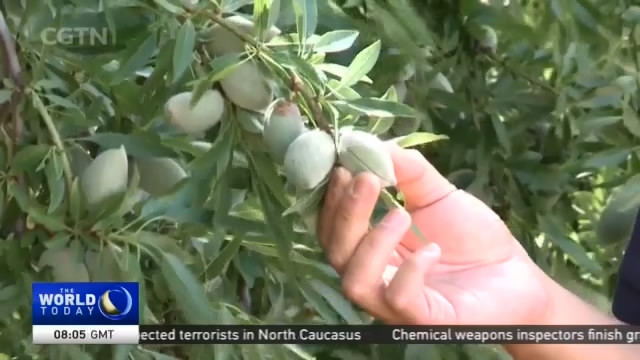
16:26, 05-May-2018
US-China Trade: China tariffs threaten to crack US almond industry
02:54

Ongoing trade frictions between China and the US are threats to American agriculture. And farmers in California worry about the effect on the state's almond industry. CGTN's Mark Niu reports.
In California's Central Valley, Mapes Ranch has been a family-owned farm for nearly 100 years. Everything from wheat to cattle is raised here, but still one of its biggest and hottest sells is the almond.
MARK NIU MODESTO, CALIFORNIA "China is the third largest export destination for California almonds with a total market value of more than 500 million dollars a year. The California Almond Board says prior to the tariffs, it expected to export to China to grow by 6% each year."
BILL LYONS, CEO MAPES RANCH "I think the biggest concern is what's coming. Regarding almonds, the proposed additional 15% tariff along with the existing 10%. That's a 25% tariff on almonds. And that would be a pretty dramatic impact to the almond industry."
California's central valley produces 80-percent of the world's almonds. Lyons is out to show me why they're the global leader.
The perfect climate and plenty of technology - including an irrigation system that can be controlled by smartphone and one that waters with precision.
"So you see it drop by drop."
California exports two-thirds of its almonds and could face increased competition from cheaper almonds from countries like Australia and Chile.
KAREN ROSS CALIFORNIA SECRETARY OF FOOD & AGRICULTURE "Anything that can bump up those prices by a few dollars, if it can be easily replaced by other countries who may not be facing that same situation, then obviously that's the potential of losing markets. Because such a huge percentage of that commodity goes into the export market, that makes it even more important that we get certainty into those markets and that we're able to continue to maintain the market and grow the market."
Lyons too was the state's secretary of agriculture nearly two decades ago, so is all-too familiar with trade disputes. But he's also witnessed a growing relationship between the Chinese consumer and the American farmer, as he regularly hosts visitors from China wishing to see how California agriculture is done.
BILL LYONS, CEO MAPES RANCH "If you have people that want to make things work, things will work. I think the Chinese consumer understands the value of the American farmer. And I think it's very important both governments sit down and work out their differences because we both lose. We lose as American growers, the Chinese consumers loses an excellent product or products from America."
Lyons says this year's crop will likely be ready to harvest in August, meaning there's still time to work out a deal as to where the California almond will end up next.
Mark Niu, CGTN, Modesto, California.

SITEMAP
Copyright © 2018 CGTN. Beijing ICP prepared NO.16065310-3
Copyright © 2018 CGTN. Beijing ICP prepared NO.16065310-3